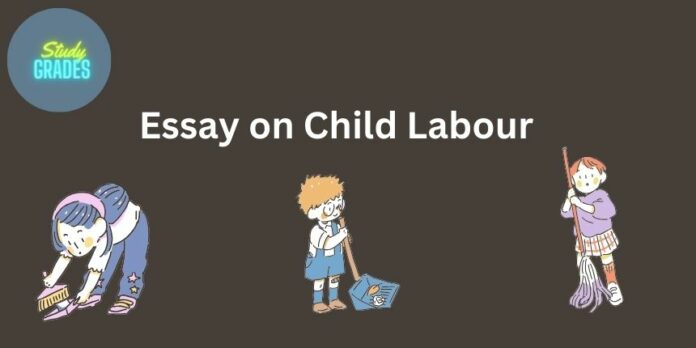Essay on Child Labour– Candidates who are seeking a good format to write essay about chile labour should refer to the below given details. Here we have provided a sample of Essay on Child Labour. Students can help from the given Child Labour essay to know what and how to write the essay about Child Labour.
Essay on Child Labour
Child labour poses a grave and pressing issue for our nation and society. The elimination of child labour has become a formidable challenge facing our country today. In contemporary India, it has regrettably become all too common to witness children engaged in arduous work. Child labour has been turned into a lucrative enterprise by influential individuals and criminal syndicates, resulting in a worrisome surge in child labour within our borders, ultimately robbing our children of their cherished childhood. This detrimental phenomenon not only jeopardizes the future of these children but also impedes our nation’s progress.
What is Child Labour?
Child labour refers to the employment of children under the age of 14, depriving them of their rightful childhood, recreational opportunities, and access to education. It entails the physical, mental, and social exploitation of these young souls who are coerced into working for meager wages. Child labour is unequivocally illegal and universally condemned by every stratum of society.
Adverse Consequences of Child Labour
Children engaged in child labour often suffer from malnutrition, resulting in a lack of physical vitality and a gradual decline into malnourishment. Many young boys and girls are subjected to physical abuse while toiling as child labourers. Shockingly, child labour remains a profoundly serious issue that is frequently overlooked. The mental torment suffered by these children detrimentally impacts their developing minds.
Causes of Child Labour
In accordance with Article 24 of the Constitution of India, 1950, the employment of children under the age of 14 in roles such as factory laborers, hotel staff, kitchen assistants, and domestic servants is classified as child labour. Several factors contribute to the perpetuation of child labour.
The most significant factor driving child labour is the pervasive poverty afflicting our country. Families grappling with poverty are often incapable of securing their livelihoods, compelling them to send their children to work as child laborers.
Inadequate access to education has also perpetuated the problem of child labour, with children often being forced into employment due to familial obligations.
In some instances, the absence of earning members in the family forces children into roles in hotels, food stalls, or factories to make ends meet.
Tragically, a considerable number of children in our country are orphans, and this grim reality provides an opening for unscrupulous individuals to exploit and force them into begging and laboring.
Indigent families struggle to support themselves, and as a result, all family members, including children, are compelled to engage in wage labor, irrespective of their desires.
How to Remove Child Labour?
- Raise awareness about the consequences of child labour and advocate for its elimination through campaigns, media, and public discourse.
- Strengthen existing child labour laws and enforcement mechanisms to provide more comprehensive protection for children.
- Implement social welfare programs aimed at poverty alleviation, as poverty is a major driver of child labour.
- Offer skill development and vocational training programs to older children to equip them with employable skills
Conclusion
The persistence of child labour stands as a formidable impediment to our nation’s development. Furthermore, it deprives children of the laughter, play, and education that should define their formative years. The government has enacted several laws aimed at combatting child labour, including:
- (i) The Child Labor (Prohibition and Regulation) Act
- (ii) The Juvenile Justice (Care and Protection) of Children Act of 2000
- (iii) The Right of Children to Free and Compulsory Education Act, 2009.
To ensure a brighter future for our children and the progress of our nation, the eradication of child labour is an urgent and collective responsibility.






